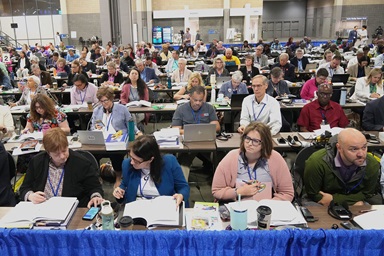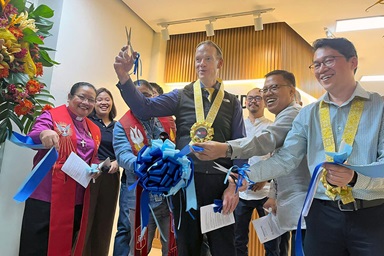Angeline was 12 when she saw the world in front of her open up on a computer screen at the Thomas Food Project in Haiti.
It was three years after the devastating earthquake of 2010, and Angeline worked in her school's solar-powered computer lab, a lab that would not have been possible without the efforts of local and U.S. partners.
Turning on a computer for the first time was a moment of wonder and revelation. “I want to use it for research,” she said of the computer. “I would like to know a lot of things.”
The partners behind the computer lab include United Methodist California-Nevada Annual Conference, United Methodist Communications and socially minded tech firm Inveneo. They are among a growing number of game changers using communications and technology to transform lives.
Some of the world’s foremost game changers will gather Sept. 3-5 in Nashville, Tennessee, for three days of sharing knowledge about communications technology and how it is making a difference in places such as Haiti, the Philippines and throughout Africa.
The Game Changers Summit is sponsored by United Methodist Communications.
“We will bring together leading implementers of technology and leading practitioners of technology and change in development with the leadership of the church, to have a conversation that exposes the church to what is available,” said the Rev. Larry Hollon, top staff executive of United Methodist Communications. The summit will also expose those in the communications technology field “to what the church can do in implementing this technology,” he said.
For more than three years, United Methodist Communications has been working with stakeholders in the church and in the private sector to find the technology and develop the processes that have come to be known as information and communications technology for development, or ICT4D.
An important tool
“In many parts of the world where our congregations are growing fastest, communications that used to happen through word of mouth, print or radio in the church or community increasingly are happening through a device that many of us will not leave home without: the cell phone,” wrote Hollon and the Rev. Neelley Hicks, director of the agency’s ICT4D church initiatives program, in “Using Technology for Social Good.” Both Hollon and Hicks are among the game changers for the Nashville conference.
“More than 7 billion mobile subscriptions are in use today, over 5 billion of which can be found in developing countries,” they continued. “Rising mobile network coverage and falling costs of mobile phone handsets mean that in many parts of the world we are beginning to overcome the digital divide.
“While technology is not a panacea, it can be an important tool for development.”
And it is a tool that cannot be ignored.
“The use of technology today is not an option,” Hollon said. It’s a requirement not only for the church but for people who are not yet fully informed about what technology can do, he said.
For example, he cited women in northern Kenya who grow crops and sell them to a middle distributor, who then sells them elsewhere. Equipped with technology, the women now know the market prices in Nairobi and other cities, so they can negotiate a better price with the distributor.
Leading thinkers
Game changers who will be in Nashville to share their knowledge at the conference include:
- Bruce Baikie executive director of Inveneo and the founder of Green WiFi, who recently helped bring Internet access to hard to reach schools in Haiti and Micronesia.
- Ken Banks, who founded kiwanja.net, which helps make better use of information and communication technologies, and created FrontlineSMS, a text-messaging platform helping drive social change projects in 170 countries.
- Ernani Celzo, communications ministry coordinator of the Baguio Episcopal Area-Philippine Central Conference of The United Methodist Church, who helped provide wireless link connections to relief organizations in the Yolanda-stricken areas of Leyte.
- Firdaus Kharas, founder of Chocolate Moose Media, a hybrid social enterprise that has produced nearly 2,400 animated behavior change communications shorts that have been shown in more than 150 countries.
- James Lazarre, project manager for Haiti’s Thomas Food Project, who oversees the day-to-day operations and manages the school’s new computer center.
- Pierre T. Omadjela, director of communications and development of the Central Congo Episcopal Area and field representative of UMCom, who is providing training for church communications directors in Africa in FrontlineSMS and Ushahidi Mapping.
- Linda Raftree, who co-founded Kurante Consulting and has conducted research on adolescent girls and information communications technology, the role of technology in the migration of children and youth, and the use of mobile technologies in youth workforce development.
New approach to mission
Hicks says the September conference is for all who want to better understand and use technology — those already trying to integrate technology into missions, those who see the need but don’t know where to start, and those applying technology in their mission work but want to learn the latest practices.
Participants will receive workbooks that they can use for their projects as topics are addressed at the conference. Networking times will allow them to talk about their programs with the speakers.
“If you’re tired of doing the same old mission year after year, and want new missions that can involve young adults fluent in technology, new missions that can generate income for sustainability, new missions that can help people on the ground reach others with messages of hope and healing, you need to come,” Hicks said.
Chenayi Kumuterera, communicator for the Zimbabwe Episcopal Area, is working on two projects using communications technology to change lives.
One involves promoting health awareness and alerts to people in Nyadire to reduce client treatment default rates. For that project, Kumuterera uses Frontline SMS software.
She also is working on preparations for the Zimbabwe Episcopal Area’s Ebenezer Convention, which will take place Aug. 15-17 at the national sports stadium in Harare. She has created databases for different committees to text message information.
April Grace G. Mercado, special projects manager and field representative for United Methodist Communications in the Philippines, is among the game changers who will be at the conference. She is now working on Philippines Central Conference Crowd Mapping, which addresses the need to know the exact number and locations of United Methodist churches around the globe.
“From this we can make a database of all our local churches, the districts and the annual conferences that they belong in,” Mercado explained. “Anyone who has access to the Internet is served by this project, especially those who are transient UM members who are looking for a church to worship in during out-of-town or out-of-the-country trips.
“The project uses global positioning system and geo-fencing. By the use of a smart phone, you can pinpoint the exact location of a church by getting its coordinates.”
Scale and impact
Because of its scale and global presence, The United Methodist Church is in a position to use technology in ways that few organizations can.
“We as a church often have access to people that are beyond the end of the road,” Hollon said. “They’re in rural villages where major corporations don’t see such a market for profit that they would actually serve these people. We can bring that technology to people at the end of the road and in the bush, and equip them so that they can have access to information. We can put the practitioners in touch with villages for community development that brings the technology and the people together in new ways that are beneficial to the community.”
For summit details, send an email to [email protected] or call (877) 228-3168.
Hillery is a correspondent for United Methodist Communications and a former news editor for the agency’s United Methodist News Service team.
Like what you're reading? Support the ministry of UM News! Your support ensures the latest denominational news, dynamic stories and informative articles will continue to connect our global community. Make a tax-deductible donation at ResourceUMC.org/GiveUMCom.




